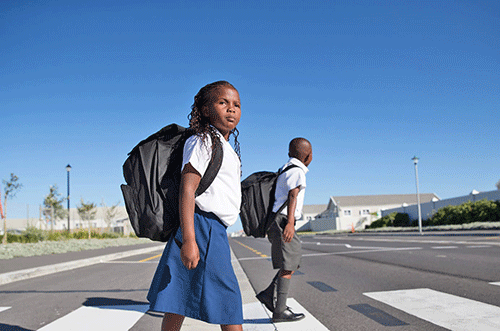Community Policing Officer
Crashes involving learners are partially attributed to their careless behaviour as pedestrians as well as lack of support and knowledge from parents. Young children have the motor skills to access roadways, yet they do not have the cognitive and behavioural abilities to understand traffic. It is noticeable during patrols that children move quickly and impulsively without taking the necessary precautions when crossing the road. This then places them at high risk of being run over by vehicles.
These risks are evident as children walking to school are seen countless times on Windhoek City Police CCTV cameras neglecting to observe traffic or stop at the pavement before crossing the street.
Unfortunately, many parents are too reluctant to take the safety of their children serious and therefore leave it up to the children to handle the traffic environment as a pedestrian on their own. On numerous occurrences, the police have witnessed parents allowing kindergarten-aged children to cross-residential streets alone and first-grade children to walk to school unsupervised. Children of different age groups are also seen playing soccer and engaging in other activities on the busy streets of Windhoek on a daily basis. For example, the children are found walking on the roadway when going to and from school. Conversely, we also have those that spend their afternoons seated on pavements engaging in conversations. In addition, children are most likely to be run over by a motor vehicle on a residential street close to their home. The most common type of crash reported involving children is one were a child walks or runs into the road unsupervised, often from a position out of view of the motorist. To reduce accidents involving children, parents should be good pedestrian role models by carefully supervising children around traffic, escorting them to school and teaching them how to be safe pedestrians. Reflective clothing and other visibility aids should be considered during dark hours.
Parents who allow minor children onto the streets without adequate supervision may face legal repercussions for child neglect. This stern approach underscores the importance of parental responsibility in safeguarding children’s lives.
Recognising the gravity of the situation, the City of Windhoek has implemented a series of traffic calming measures. These include speed humps, pedestrian crossings, and the installation of speed limit signs in residential areas and near schools. Furthermore, pedestrian rails have been strategically constructed to deter pedestrians from crossing at high-risk accident zones. The safety of our children as pedestrians is a shared responsibility that extends from parents to communities and law enforcement agencies. Addressing the issue of children’s vulnerability on the roads requires a collective effort, with parents taking the lead in ensuring their children’s safety through supervision, education, and the use of visibility aids.
Do your part and help the Windhoek City Police in its effort in making Windhoek the safest city in Africa.
Contact the Windhoek City Police Service on 061 302 302 or 061 290 2239 for any emergencies and crime related issues.



